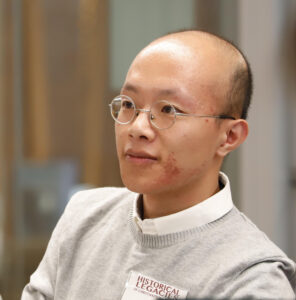Chow, Alexander C. “Christianity as a Chinese Religion: A Theological Consideration.” Ching Feng, n.s., 17, no. 1–2 (2018): 27–41.
- This article examines the theological evolution of Chinese Christianity and highlights its alignment with a core principle of Chinese spirituality—the unity of Heaven and humanity. The author argues that Chinese Christianity should be recognized as an authentic expression of Chinese religious identity.
Lee, Christine, and Huang Jianbo. “Making Christianity Chinese: Sinicization Outside State Narratives.” China Perspectives (2023): 3–8. Accessed February 22, 2025. https://doi.org/10.4000/chinaperspectives.15300.
- This editorial discusses the complex ongoing process of “Sinicization” in contemporary China, arguing that Christianity has always been adapting to and mirroring Chinese culture; its growing popularity is due to the efforts of local Chinese rather than foreign associations, suggesting that Christianity has always been a Chinese religion.
Madsen, Richard. “Epilogue. Multiple Sinicizations of Multiple Christianities.” In Sinicizing Christianity, edited by Zheng Yangwen, 319–326. Leiden: Brill, 2017.
- Madsen’s epilogue to this volume restates the importance of understanding Christianity’s variability and adaptability rather than viewing it as static and monolithic.
Madsen, Richard. “Introduction.” In The Sinicization of Chinese Religions: From Above and Below, edited by Richard Madsen, 1-15. Leiden: Brill, 2021.
- By incorporating various scholars’ studies on the major religions and their responses to Sinicization in China, Madsen in this introduction highlights the differences in the approaches to Sinicization from above and below and suggests that the impact of Sinicization from below may be more profound.
Vala, Carsten. “Official Protestant Groups Plan Next Five Years of Sinicization: What Does the TSPM/CCC 5-Year Plan Tell Us about the Direction of Official Protestantism?” ChinaSource Blog, April 3, 2024. Accessed February 15, 2025. https://www.chinasource.org/resource-library/blog-entries/official-protestant-groups-plan-next-five-years-of-sinicization/.
- Vala compares the TSPM/CCC’s new five-year plan with the previous plan, tracing a stronger emphasis on patriotism and politics on the part of the official Protestant Church.
Vermander, Benoît. “Sinicizing Religions, Sinicizing Religious Studies.” Religions 10, no. 2 (2019): 137. Accessed March 12, 2025. https://doi.org/10.3390/rel10020137.
- Vermander analyzes the relationship between Sinicization and academic autonomy. He posits that scholars aim for a balance between these two aspects by shifting their research to the past. However, this shift might inadvertently diminish the “Chineseness” of the Sinicization of religion.
Yang, Fenggang 楊鳳崗. “Chapter 1: Sinicization or Chinafication? Cultural Assimilation vs. Political Domestication of Christianity in China and Beyond.” In The Sinicization of Chinese Religions: From Above and Below, edited by Richard Madsen, 16–43. Leiden: Brill, 2021.
- In this chapter, Yang Fenggang aims to clarify the origin of the word Zhongguohua and traces its political implications in recent Christian studies. For this reason, Yang advocates for the adoption of “Chinafication” over “Sinicization” to differentiate the political and cultural connotations of these two words.
Yang, Fenggang 楊鳳崗. “Xi Jinping Is Not Trying to Make Christianity More Chinese.” Christianity Today, January 16, 2024. Accessed January 28, 2025. https://www.christianitytoday.com/2024/01/china-christianity-xi-religion-policy-sinicization/.
- In this article, Yang Fenggang reiterates his proposal of differentiating Sinicization from Chinafication. The author concludes that despite the challenging circumstances, Christianity will continue to survive due to the perseverance of its believers and the extensive Sinicization it has already undergone.
Zheng, Yangwen, “Introduction.” In Sinicizing Christianity, edited by Zheng Yangwen, 1–30. Leiden: Brill, 2017.
- Zheng Yangwen’s introduction to the book suggests that the spread of Christianity and its Sinicization process were largely influenced by historical circumstances and the pragmatic use of Christianity, revealing the multifaceted nature of this religion’s Sinicization.
Bi via Adobe Stock, generated by AI.

Jordan Wang
Jordan Wang is a historian of World Christianity. He received his PhD in Religious Studies from The Chinese University of Hong Kong. He co-founded AI-demia, an academic consultancy startup. He is currently a sessional instructor at the University of Alberta and Ambrose Seminary. His research interests focus on public theology, …View Full Bio

Naomi Thurston
Naomi Thurston is a scholar of contemporary Chinese Christianity based at The Chinese University of Hong Kong (CUHK). Her research focuses on the contributions of Chinese intellectuals to issues in contextual and academic theology and Christian studies. She has translated the writings of contemporary Chinese scholars and currently serves as the director of …View Full Bio

Olivia Law
Olivia Law is a graduate student and research assistant in the Divinity School of Chung Chi College, The Chinese University of Hong Kong. In addition to this work, Olivia Law is also working on a project related to female missionary activities of the Stewards in colonial Hong Kong.View Full Bio